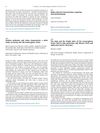 50 citations,
May 2004 in “Journal der Deutschen Dermatologischen Gesellschaft”
50 citations,
May 2004 in “Journal der Deutschen Dermatologischen Gesellschaft” Estrogens generally inhibit hair growth and improve skin quality, but their exact effects on hair follicles are complex and not fully understood.
 19 citations,
January 1997 in “Dermatologic Clinics”
19 citations,
January 1997 in “Dermatologic Clinics” Most treatments for hair loss in 1997 were not effective for most people, and maintaining hair growth was difficult.
 13 citations,
November 2013 in “Journal of Endocrinology/Journal of endocrinology”
13 citations,
November 2013 in “Journal of Endocrinology/Journal of endocrinology” Vitamin D receptor helps control hair growth genes in skin cells.
 6 citations,
January 2011 in “Springer eBooks”
6 citations,
January 2011 in “Springer eBooks” Nutrition is important for skin health, and changing diet can help prevent and treat skin diseases.
 December 2022 in “Journal of Phytonanotechnology and Pharmaceutical Sciences”
December 2022 in “Journal of Phytonanotechnology and Pharmaceutical Sciences” Ayurvedic treatment helped a woman with PCOS become pregnant and have a healthy baby.
 August 2015 in “Free Radical Biology and Medicine”
August 2015 in “Free Radical Biology and Medicine” Nrf2 helps protect skin from damage but too much can cause skin problems.
 March 2024 in “Romanian Medical Journal”
March 2024 in “Romanian Medical Journal” Inositol shows promise in treating PCOS and other health issues, but more research is needed.
 271 citations,
September 2008 in “Nutrition reviews”
271 citations,
September 2008 in “Nutrition reviews” Vitamin D receptor interacts with certain dietary components to help prevent diseases and regulate hair growth.
 197 citations,
January 2019 in “Neuropsychopharmacology”
197 citations,
January 2019 in “Neuropsychopharmacology” Male and female bodies respond differently to stress, influenced by hormones and development stages, with implications for stress-related diseases.
 185 citations,
February 2018 in “Journal of Investigative Dermatology”
185 citations,
February 2018 in “Journal of Investigative Dermatology” Melatonin may benefit skin health and could be a promising treatment in dermatology.
 143 citations,
October 1996 in “Dermatologic Clinics”
143 citations,
October 1996 in “Dermatologic Clinics” Too much androgen can cause hair loss; finasteride may help.
 68 citations,
September 2003 in “British Journal of Dermatology”
68 citations,
September 2003 in “British Journal of Dermatology” Shrinking skin cancer increases the chance of cancer in nearby lymph nodes.
 65 citations,
October 2008 in “Journal of Neuroendocrinology”
65 citations,
October 2008 in “Journal of Neuroendocrinology”  61 citations,
June 2014 in “Scientific Reports”
61 citations,
June 2014 in “Scientific Reports” Wnt1a-conditioned medium from stem cells helps activate cells important for hair growth and can promote hair regrowth.
 57 citations,
May 1986 in “Clinics in endocrinology and metabolism”
57 citations,
May 1986 in “Clinics in endocrinology and metabolism” Androstanediol glucuronide is a reliable marker for hirsutism in women.
 54 citations,
February 1993 in “Endocrine reviews”
54 citations,
February 1993 in “Endocrine reviews” Androgen conjugates might be better indicators of skin sensitivity to hormones in women with excessive hair growth.
 49 citations,
January 2004 in “Journal of steroid biochemistry and molecular biology/The Journal of steroid biochemistry and molecular biology”
49 citations,
January 2004 in “Journal of steroid biochemistry and molecular biology/The Journal of steroid biochemistry and molecular biology” Selective non-steroidal inhibitors of 5α-reductase type 1 can help treat DHT-related disorders.
 46 citations,
October 2012 in “Dermatologic Clinics”
46 citations,
October 2012 in “Dermatologic Clinics” Female pattern hair loss diagnosed by scalp appearance, treated with combined therapies and targeted approaches.
 43 citations,
October 2019 in “Pediatric Research”
43 citations,
October 2019 in “Pediatric Research” Lifestyle changes are the main treatment for PCOS, which is a complex condition requiring early management to reduce its health impacts.
 43 citations,
January 2007 in “Gynecological Endocrinology”
43 citations,
January 2007 in “Gynecological Endocrinology” Finasteride improves acne and hair loss in women with normal testosterone.
 41 citations,
September 1991 in “Medical hypotheses”
41 citations,
September 1991 in “Medical hypotheses” Prolactin may be important for skin growth and immune function.
 39 citations,
May 2011 in “Human Immunology”
39 citations,
May 2011 in “Human Immunology” Genetics play a role in acne, but how exactly they contribute is not fully understood.
 34 citations,
July 2010 in “Expert Opinion on Drug Delivery”
34 citations,
July 2010 in “Expert Opinion on Drug Delivery” The document concludes that there is no agreed-upon best method for measuring drug delivery within hair follicles and more research is needed to validate current techniques.
 31 citations,
January 2017 in “Advances in Experimental Medicine and Biology”
31 citations,
January 2017 in “Advances in Experimental Medicine and Biology” Low testosterone and 5α-reductase inhibitors can harm men's metabolic and sexual health; testosterone therapy may help, but discussing 5α-RIs' side effects is important.
 28 citations,
April 2014 in “Hormones”
28 citations,
April 2014 in “Hormones” Higher androstenedione levels in women with PCOS are linked to more severe symptoms.
 27 citations,
December 2005 in “Journal of Cosmetic Dermatology”
27 citations,
December 2005 in “Journal of Cosmetic Dermatology” Niacin derivatives may increase hair fullness in women with hair loss.
 27 citations,
April 2013 in “Reviews in endocrine and metabolic disorders”
27 citations,
April 2013 in “Reviews in endocrine and metabolic disorders” The document concludes that using LC-MS/MS for measuring androgens is more accurate than older methods, but it needs careful validation and standardized references to be most effective.
 26 citations,
February 2009 in “Drug Development Research”
26 citations,
February 2009 in “Drug Development Research” 17α-estradiol is a safe estrogen that might protect the brain and doesn't cause feminization, needing more research for treating brain diseases.
 24 citations,
September 1996 in “Mycoses”
24 citations,
September 1996 in “Mycoses” Androgenic steroids can slow down or stop the growth of certain skin fungi.
 20 citations,
January 2017 in “Actas Dermo-Sifiliográficas”
20 citations,
January 2017 in “Actas Dermo-Sifiliográficas” Recent advances in hair loss treatments show significant progress.






























